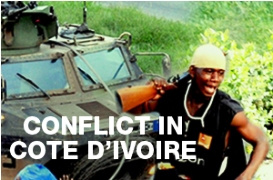 Laurent Gbagbo, Cote d'Ivoire's incumbent leader, is negotiating his departure after several days of heavy fighting in Abidjan between his forces and those loyal to rival Alassane Ouattara, according to his government spokesman.
Laurent Gbagbo, Cote d'Ivoire's incumbent leader, is negotiating his departure after several days of heavy fighting in Abidjan between his forces and those loyal to rival Alassane Ouattara, according to his government spokesman.
"There are direct negotiations based on African Union recommendations which said Ouattara is president," Ahoua Don Mello said on Tuesday.
They are also negotiating judicial and security conditions for Gbagbo's camp and his relatives," he said, adding that they are talking to the French government which is relaying the talks to the Ouattara camp.
Alain Juppe, the French foreign minister, confirmed that Gbagbo is indeed negotiating his departure.
According to Juppe, negotiators are close to convincing Gbagbo to leave.
Officials said Gbagbo was huddled in a bunker at home, surrounded by troops supporting Ouattara, the country's internationally recognised president.
Gbagbo refused to step aside after losing the presidential election in November.
Meanwhile, YJ Choi, the special representative of the United Nations secretary-general for Cote d'Ivoire told Al Jazeera "the war is over".
"All the generals who are fighting for Gbagbo have deserted him, it is over. There is no army, there is no flighting," he said.
Barack Obama, the US president, has renewed his call for Gbagbo to immediately leave power to help end violence.
"To end this violence and prevent more bloodshed, former president Gbagbo must stand down immediately, and direct those who are fighting on his behalf to lay down their arms," Obama said in a statement.
Exit strategy
Soldiers loyal to Gbagbo have asked for a ceasefire in the face of the offensive launched by Ouattara's forces last week.
General Philippe Mangou told AFP news agency on Tuesday that his troops had stopped fighting and requested a ceasefire after UN and French troops backed Ouattara's forces.
|
|
||
|
|
Earlier, Gbagbo strongholds were surrounded by Ouattara's troops and a fight was under way for control of the gendarmerie camp in Cocody district, residents said, as heavy weapons fire shook the city for a second day.
Ally Coulibaly, the ambassador to France appointed by Ouattara, told French radio station RFI that he understood Gbagbo was negotiating his surrender, but admitted Abidjan was a "rumour mill".
"What I have learned is that since yesterday he [Gbagbo] has been seeking to negotiate. It is not too late," said the diplomat, a close advisor to Ouattara.
Coulibaly said he did not know through what channels Gbagbo was negotiating or whether a mediator was involved.
Gbagbo's options limited
Al Jazeera's Haru Mutasa, reporting from Bassam, just outside Abidjan, said Gbagbo's options are limited.
"The fighting seems to have stopped for a while, which means perhaps something could be happening. No one knows where Gbagbo is but wherever he is, his options are clearly limited. The only option he could have is accept some kind of exit package, maybe going into exile."
French president Nicolas Sarkozy spoke to Ouattara twice on Tuesday to discuss the situation in Cote d'Ivoire.
Sarkozy said in a statement that he had authorised the French force to help in the operation following an appeal from UN Secretary-General Ban Ki-moon, who said the use of force was necessary to prevent further attacks on civilians.
"In the past few days, forces loyal to Mr Gbagbo have intensified and escalated their use of heavy weapons such as mortars, rocket-propelled grenades and heavy machine guns against the civilian population in Abidjan," Ban said in a statement.
Following four months of attempts to negotiate Gbagbo's departure, the UN Security Council unanimously passed a resolution giving the 12,000-strong peacekeeping operation the right "to use all necessary means to carry out its mandate to protect civilians under imminent threat of physical violence ... including to prevent the use of heavy weapons against the civilian population."
Our correspondent said people living outside Abidjan were "on edge" after hearing that an "all-out assault by Ouattara's forces is imminent".
"The disturbing thing is the checkpoints and barricades being manned by young men who are unemployed, some of them intoxicated, armed with machetes, [who] decide who goes in and out of Abidjan," she said.
Adam Gaye, a west African analyst, told Al Jazeera that Ouattara's government will be tainted by the loss of life in the uprising against Gbagbo.
Source:Aljazeera.net/english

